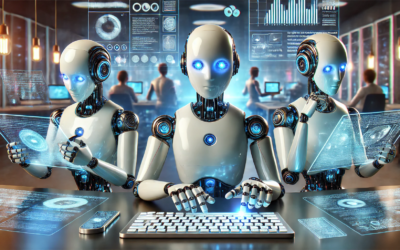Artificial intelligence (AI) has made significant strides in automating various aspects of software development. AI-powered coding assistants, such as GitHub Copilot, ChatGPT, and Tabnine, are revolutionizing how code is written, tested, and deployed. With AI’s increasing capabilities, many are questioning whether human developers will still be needed in the future. This article explores the role of AI in coding, its limitations, and the continued importance of human developers.
The Rise of AI-Generated Code
AI models trained on vast amounts of open-source code can now generate functional code snippets, debug errors, and even suggest optimizations. These AI tools help reduce the time spent on repetitive tasks and improve productivity. Some key benefits include:
- Speed and Efficiency: AI can generate boilerplate code, refactor existing code, and provide instant documentation.
- Error Detection: AI can identify potential bugs and suggest fixes before they become critical issues.
- Code Completion and Suggestions: Developers can receive real-time coding suggestions, reducing manual effort.
Limitations of AI-Generated Code
Despite its advancements, AI-generated code is far from replacing human developers due to several limitations:
- Lack of Creativity and Problem-Solving: AI can generate code based on patterns, but it lacks true creativity and the ability to think outside the box.
- Understanding Context and Business Logic: AI struggles to grasp the broader context of a project, making it prone to generating irrelevant or inefficient code.
- Security and Ethical Concerns: AI-generated code may inadvertently introduce security vulnerabilities, and there are concerns regarding code plagiarism and intellectual property.
- Debugging and Maintenance: AI can help identify errors, but human expertise is needed to analyze complex issues and optimize performance.
The Evolving Role of Developers
Rather than replacing developers, AI is transforming their roles. Instead of spending time on repetitive coding tasks, developers can focus on:
- Designing Architecture: Developers will play a crucial role in designing scalable and efficient software architectures.
- Problem-Solving and Innovation: Complex problem-solving, innovative solutions, and creativity remain essential human skills that AI cannot replicate.
- Ethical and Secure Development: Ensuring AI-generated code adheres to ethical and security standards will be a significant responsibility.
- AI Supervision and Fine-Tuning: Developers will need to train, fine-tune, and supervise AI models to ensure accuracy and effectiveness.
Future Outlook
The integration of AI into software development will continue to accelerate. However, rather than eliminating the need for developers, AI will act as an advanced tool that enhances human productivity. Companies will likely adopt a hybrid model where AI assists with routine tasks while human developers oversee critical aspects of software creation.
Conclusion
AI-generated code is a powerful tool that enhances efficiency, but it does not eliminate the need for developers. Human creativity, problem-solving, and contextual understanding remain irreplaceable. As AI continues to evolve, developers must adapt and embrace AI-assisted coding to remain at the forefront of technological advancements.



